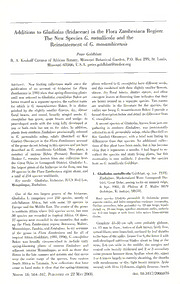
Additions to Gladiolus (Iridaceae) in the Flora Zambesiaca Region: The New Species G. metallicola and the Reinstatement of G. mosambicensis PDF
Preview Additions to Gladiolus (Iridaceae) in the Flora Zambesiaca Region: The New Species G. metallicola and the Reinstatement of G. mosambicensis
Additions to Gladiolus (Iridaceae) in the Flora Zambesiaca Region: The New Species G. metallicola and the Reinstatement of G. mosambicensis Peter Goldblatt B. A, Krukoff Curator of African Botany, Missouri Botanical Garden, P.0. Box 299, St. Louis, Missouri 63166, U.S.A. [email protected] Abstract. New flu t ng 1] l o m le tl • plants referred to G. crassifolius have different seeds, publication of an account of Iridaceae for Flora and this combined with their slightly smaller flowers, Zambesiaca in 1993 show that spring-flowering plants obtuse, dry floral bracts, shorter stature, and often until now referred to Gladiolus crassifolius Baker are emergent leaves at flowering time indicates that they better treated as a separate species, the earliest name c 1 He L e I 1 s iparate species. Two names for which is G. mosambicensis Baker. It is distin¬ are available in the literature for the species, the guished by the slightly smaller flowers, dry, obtuse earlier one being G. mosambicensis Baker. I provide a floral bracts, and round, broadly winged seeds; G. formal description below and detail its difference from crassifolius has green, acute bracts and wedge- to pear-shaped seeds with the wing fully developed at A second species of Gladiolus, known from just one one or both ends but not on the sides. In addition, gathering in northern Zimbabwe, was provisional! plants from northern Zimbabwe provisionally referred referred to as G. permeabilis subsp. edulis (Burchell f G- permeabilis subsp. edulis (Burchell Ker Gawler) Obermeyer, with a brief note lisling jts Gawler) Obermeyer in the Flora Zambesiaca account differences from that species. No additional collec¬ of the genus do not belong in this species and are here tions of this plant have been made, but it has become described as G. metallicola Goldblatt. This plant, a clear that it represents a novelty. I had hoped to re- member (Persoon) Bentham & collect the species and study living plants, but this Hooker f., remains known from one collection from eventuality is now unlikely. I describe the species the Great Dyke in Lomagundi District. Gladiolus L., here as G. metallicola Goldblatt. the largest genus of the Iridaceae in the flora, now has 3aM 9to Kosztepaayeml cobwiefio qs2ru d5iens4,: tZshpiemGe cFlbaialedobsirwo awl euZ.os ar, lmdIrwbideidsaeica.e caae ,r eIgUioCnN a lRoende , Lainsdt, 1. GZt8lra iimcdAtib,op aGrlbu. wrse 1eam,9t 8MDe1ty,aa kslleDhi,oc. naomaPlalhoa innGlgcdoo rlWxdo bcekl&sast t: t o,TL n.s o psm.Mu amnugomluvlen.i rtdT irY 9idD0Pgi7Ese¬9:, One of the two largest genera of the Iridaceae, (holotype, K; isotype, SRGH). Gladiolus L. comprises over 250 species, mostly of IIaec species Gladiolo permeabih D. Delaroche primo sEuubr-oSpaeh aanradn thAe frMiciad,d lbe uEt aswt.i thT heso cmeen te1r0 ofs ptheec igese nuins aflsopreibcutus rsniminiolirsi,b usse,d t ufboold^ sp emriaarngtihniiib ucas. cloOs^trisoqmu elo ningcor,a stespatailso, is southern Africa where 165 species occur, but over 80 species are recorded in tropical Africa. Of these, 37 species were recorded in the countries that make up the Flora Zambesiaca region: Botswana, Malawi, Geophyte 45-50 cm tall; corm probably globose, Mozambique, Zambia, and Zimbabwe. In my accounts ca. 15 mm in diam., tunics of dark brown, fairly fine, of the genus in Flora Zambesiaca and for all of netted fibers; stem branched, enclosed by leaf sheaths tropical Africa (Goldblatt, 1993, 1996), G. crassifolius to the base of the spike. Leaves 5 or 6, the lower 2 with Baker was broadly circumscribed to include early well-developed sublinear blades about as long as the spring-blooming plants of eastern Zimbabwe and stem, 2-6 mm wide in the middle, the margins and adjacent interior Mozambique, as well as those that central vein heavily thickened and 2 or 3 secondary flower in the late summer and autumn and that occur veins present between them, hyaline when dry, upper over the entire range of the species, from eastern 3 or 4 leaves largely to entirely sheathing, the sheaths South Africa to Tanzania. New collections that have with membranous or dry, light brown margins. Spike come to hand make it clear that the spring-blooming secund, with 10 to 15 flowers, slightly flexuose; bracts Novon 18: 164-167, Published on 22 May 2008. doi: 10.3417/2006070 18, Number 2 Goldblatt Gladiolus in
